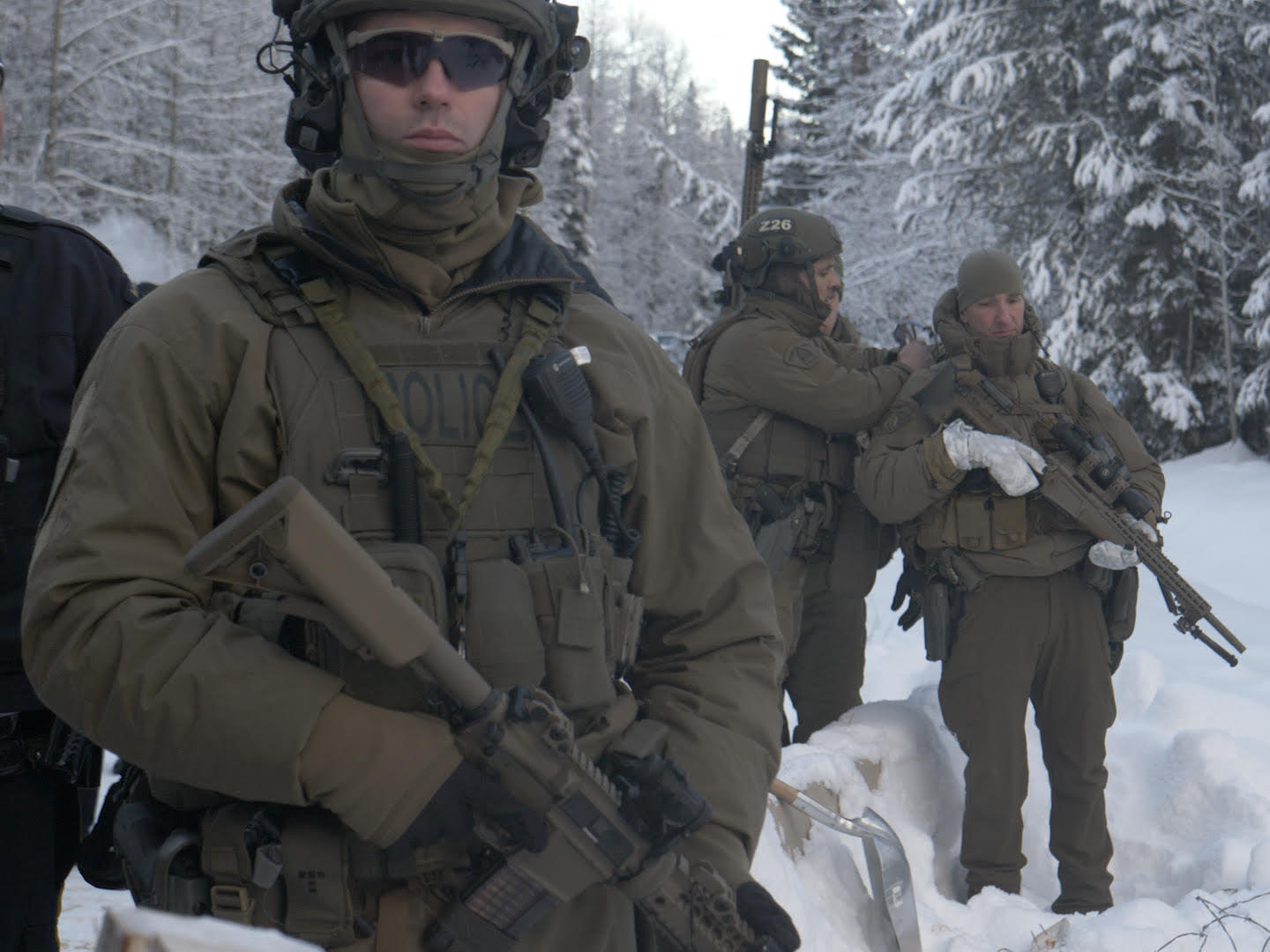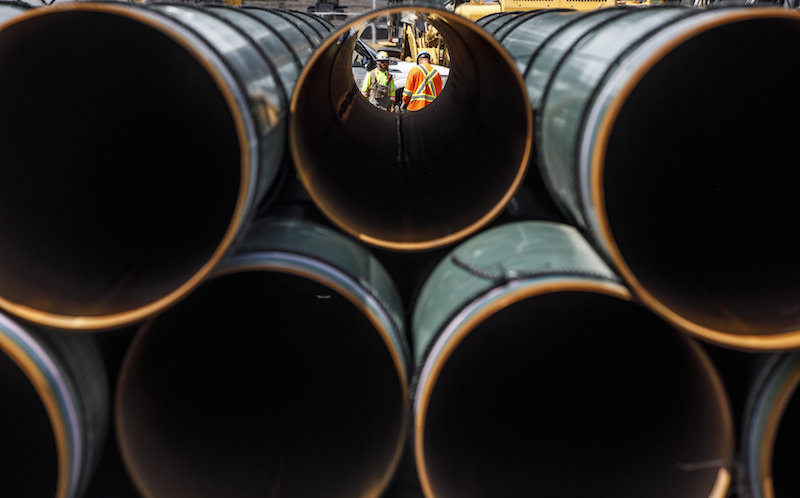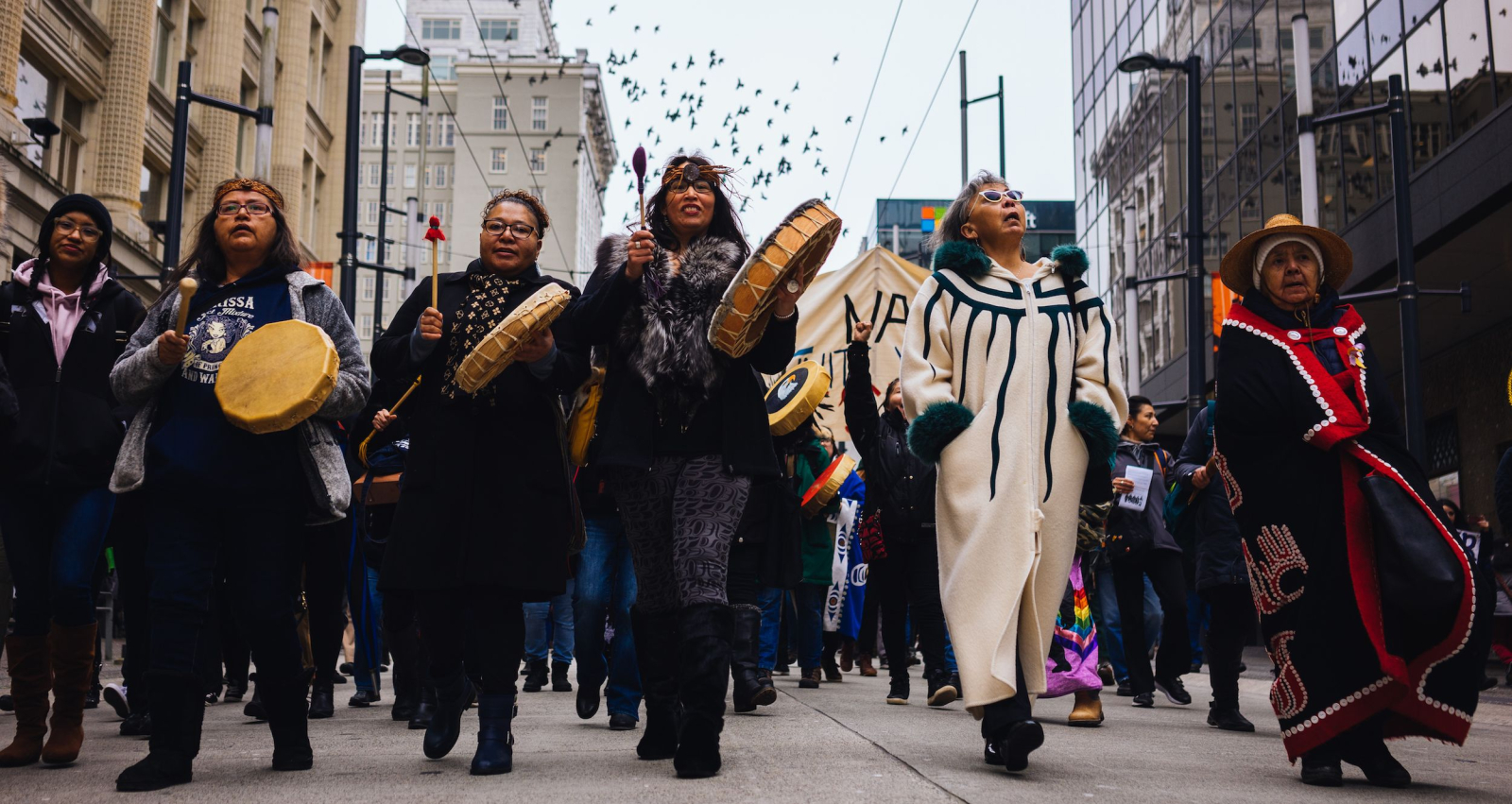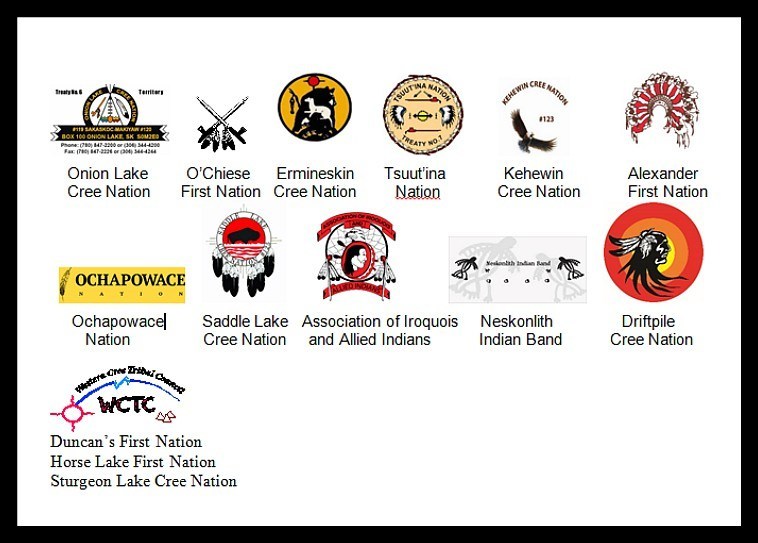Experts say the world is watching to see if Canada heeds a call from the UN Committee on the Elimination of Racial Discrimination to immediately suspend work on the Coastal GasLink pipeline, the Trans Mountain pipeline and the Site C dam until ‘free, prior and informed consent’ is obtained from Indigenous peoples

Police climb over a barricade to enforce the injunction filed by Coastal GasLink pipeline at the Gidimt’en checkpoint near Houston, British Columbia on Monday, January 7, 2019. The pipeline company was given a permit but the Office of the Wet’suwet’en, which has jurisdiction over the territory in question, has never given consent. Fourteen people were arrested. Photo: Amber Bracken
1990, Grand Chief Stewart Phillip was at a Lil’wat Nation blockade to stop clear-cut logging and the expropriation of Mount Currie reserve land when he got a taste of how far governments in Canada are willing to go to prevent Indigenous people from protecting their lands.
“The sniper team came in in two Suburbans and went up onto the hillside and one of the Lil’wat Mount Currey band members came riding across the creek on his horse, quite panicked and warning us that there was a sniper team being deployed in the trees,” Phillip, president of the Union of B.C. Indian Chiefs, told The Narwhal.
“We had witnessed the Suburbans coming in, but he actually saw the sniper team disembark and take up positions,” Phillip recalled. “I know that to be a standard tactic on the part of the RCMP.”
As tensions escalate in the stand-off between Wet’suwet’en hereditary chiefs and Coastal GasLink — with the company posting a 72-hour injunction notice allowing the RCMP to arrest anyone blocking access to its work site as early as Friday — Phillip said there’s “an urgency” for Canada to heed a call from the United Nations and immediately halt pipeline construction on Wet’suwet’en lands and territories.
“It’s a precarious situation,” Phillip said, pointing to a recent article in The Guardian disclosing the RCMP was prepared to shoot Indigenous land defenders in the dispute over construction of the 670-kilometre Coastal GasLink pipeline to ship fracked gas to LNG Canada’s export terminal in Kitimat.
The site of the LNG Canada project in Kitimat B.C. in 2017. Photo: Garth Lenz / The Narwhal
UN says projects need ‘free, prior and informed’ consent
In a move Phillip called a “significant development,” the UN Committee on the Elimination of Racial Discrimination has issued a triple-barrelled decision calling on Canada to immediately suspend work on the Coastal GasLink pipeline, the Trans Mountain pipeline and the Site C dam until “free, prior and informed consent” is obtained from Indigenous peoples.
The committee urged Canada to immediately cease the forced eviction of Wet’suwet’en peoples who oppose the Coastal GasLink pipeline and Secwepemc peoples opposed to the Trans Mountain pipeline, to prohibit the use of lethal weapons — notably by the RCMP — against Indigenous peoples and to guarantee no force will be used against them. It also urged the federal government to withdraw the RCMP, along with associated security and policing services, from traditional lands.
In a two-page decision statement, the committee said it is alarmed by the escalating threat of violence against Indigenous peoples in B.C. and disturbed by the “forced removal, disproportionate use of force, harassment and intimidation by law enforcement officials against Indigenous peoples who peacefully oppose large-scale development projects” on their traditional territories.
Police make an arrest January 2019 while enforcing the injunction filed by Coastal GasLink at the Gidimt’en checkpoint near Houston, B.C. Photo: Amber Bracken
“It’s somewhat frustrating and embarrassing that the UN has to chide the government of Canada and the provincial government with respect to what the rule of law is in this country in regard to Indigenous land rights, Indigenous human rights,” Phillip said.
“I think it’s a reflection of the ongoing arrogance of the Trudeau government, that somehow the Trudeau government feels it’s above the law and can just simply flout the law.”
As word of the UN decision spread, Alberta Energy Minister Sonya Savage called the United Nations an “unelected, unaccountable” body that has no business criticizing Canada’s energy megaprojects.
The Canadian Association of Petroleum Producers, the country’s largest oil and gas lobby group, issued a press release saying the UN committee’s two-page decision statement “reflects an embarrassing ignorance of Canadian law.”
‘If we think back to the Holocaust, all of that was legal under German law’
But Alex Neve, secretary general of Amnesty International Canada, said the whole point of the 18-member committee is that it’s comprised of unelected human rights experts appointed by UN member states.
“We want them to be there as objective, non-partisan, non-political experts who are going to look very closely at the situations that are brought to their attention, such as these three serious human rights concerns from Canada, and make the right assessments and make the right decisions entirely free from political influence,” Neve said in an interview.
Indigenous rights scholars point out the Convention on the Elimination of All Forms of Racial Discrimination — whose implementation is monitored by the committee — holds signatories, including Canada, accountable to international human rights law.
They also note that the United Nations, with its overarching focus on human rights, was created in the wake of the Holocaust and other atrocities to ensure increased global scrutiny of human rights in individual countries, and that Canada championed the convention and was one of the first nations to sign on.
” … the process that was followed in Canada is failing … “
University of Manitoba law professor Brenda Gunn said Canadian law should not be used to try to protect or excuse actions cited by the UN committee.
“If we think back to the Holocaust, all of that was legal under German law. What this system is designed to do is to have people outside the state judging standards against something other than domestic law, to ensure that domestic law isn’t violating rights,” said Gunn, a Metis lawyer who provided technical assistance to the UN Expert Mechanism on the Rights of Indigenous People with regards to the UN Declaration on the Rights of Indigenous Peoples.
“What this committee is saying is that the process that was followed in Canada is failing to uphold Canada’s international human rights [obligations]. You wouldn’t expect this person to need to know Canadian law. All they need to know is the facts of what happened and compare that to their expertise of what is required under international law.”
Potential for ‘deep stain on Canada’s global reputation’
UBC professor Sheryl Lightfoot, a Canada Research Chair in Global Indigenous Rights and Politics, said the UN committee is pointing out that Canada’s law, policy and practice for consultation with Indigenous communities do not meet global human rights standards.
Canada has reported to the UN committee “regularly, routinely and enthusiastically” since 1970, the year after the convention was entered into force, noted Lightfoot, a citizen of the Lake Superior Band of Ojibwe who is senior advisor to the UBC president on Indigenous affairs.
“The one area that Canada stumbles on is once the CERD [Committee on the Elimination of Racial Discrimination] casts its eye on Indigenous peoples’ human rights,” Lightfoot said in an interview.
“Canada is normally held up as a role model standard on this particular issue of eliminating racial discrimination.
This is one of the few times, and the notable times, where Canada is on the receiving end of negative news.”
The UN committee decision comes as Canada vies for a coveted seat on the UN Security Council, a bid Gunn said will fall under increased global scrutiny if Canada fails to follow the committee’s recommendations.
“While we may not hear public chastising of Canada in any international forum, there will be many conversations happening in the various lounges at the UN, and elsewhere, where states that Canada was counting on for support will be saying ‘well, what about this recent decision … how do we support a seat on the security council when Canada’s record on human rights continues to be questioned?’ ”
Lightfoot said a lack of action could “create a deep stain on Canada’s global reputation.”
The committee decision follows landmark legislation passed by the B.C. government in November to implement the UN Declaration on the Rights of Indigenous People (UNDRIP). The federal government has also promised to pass legislation to harmonize Canadian laws with UNDRIP by the end of this year.
Roland Willson, chief of West Moberly First Nations, called the decision a “validation for us.”
West Moberly First Nations and Prophet River First Nation are awaiting trial dates to determine if the Site C dam unjustifiably infringes on their constitutionally protected treaty rights, as the nations claim in civil actions filed two years ago.
Among many other impacts, the Site C hydro project will destroy Indigenous burial sites and other places of spiritual and cultural importance — including traditional hunting and fishing grounds — and poison fish with methylmercury.
West Moberly First Nation Chief Roland Willson has been a vocal opponent of the Site C dam. Photo: Jayce Hawkins / The Narwhal
Site C dam called ‘cultural genocide’
Willson said West Moberly and Prophet River First Nations met with Gay McDougall, a U.S. lawyer who is the vice-chair of the UN committee, last year in Vancouver
“It’s not mass genocide that’s happening here. It’s cultural genocide,” Willson told The Narwhal.
“Ms. McDougall said to us, ‘Genocide is genocide. They’re destroying your culture and your culture is who you are as a people. So they’re killing you as a people’ … Our discussion with her verified that we’re right.”
Willson called it a “crime” to destroy the last tract of Peace River Valley available to Indigenous people to engage in traditional practices when there are cheaper and less destructive ways to produce power.
“…The thought of [U.S.] President [Donald] Trump threatening to destroy Iran’s cultural sites, everybody’s up in arms about that, saying that should be considered war crimes,” Willson said.
“Well here they’re making a decision to destroy what’s left of an intact ecosystem, a vital piece of our culture.”
Article 32 of UNDRIP says governments “shall consult and cooperate in good faith” with Indigenous peoples through their own representative institutions, in order to obtain their free and informed consent prior to the approval of “any project affecting their lands or territories and other resources” — particularly in connection with the development, utilization or exploitation of mineral, water or other resources.
Construction of the Site C dam on the banks of the Peace River. Photo: Garth Lenz / The Narwhal
In a 2019 letter to the UN committee, a copy of which was obtained by The Narwhal, the federal government said it approached the Site C project “in a manner that is consistent” with obtaining free, prior and informed consent, a claim Willson called “hogwash.”
Willson said the federal government only met once with West Moberly and Prophet River First Nations about the Site C dam, for about 20 minutes.
The meeting, with former Fisheries Minister Dominic LeBlanc, took place in Vancouver several months after the election of the Trudeau government in the fall of 2015, Willson said, describing the session as “our one avenue to talk about everything.”
Nations ‘conceded’ instead of consenting
“Conceding is far from consenting,” Willson said. “Every nation in Treaty 8 was opposed to Site C.”
But after the project — championed for decades by BC Hydro — received final B.C. government approval in December 2014, “some of the nations conceded to BC Hydro,” Willson said.
“Their decision was not free,” he said. “It wasn’t prior. It was after the fact.”
A letter Willson sent to the UN committee two months ago said many affected Indigenous peoples have not consented to construction of the Site C project, including Blueberry River First Nation, Prophet River First Nation and Fort Nelson First Nation.
“Not a single Indigenous group supported Site C before Canada had issued all major approvals, and some groups that signed an agreement on the project afterwards stated publicly that they had never consented,” Willson wrote.
Former B.C. premier Christy Clark infamously vowed she would push the Site C project past the point of no return, the letter noted.
“There was never any intent by Canada or British Columbia to consider alternatives offered by Indigenous peoples,” Willson told the committee.
The chief also questioned the notion that First Nations were given “informed” details about the Site C project.
“Bogus estimates about future energy demand were used during consultations by the Province of British Columbia and BC Hydro to manufacture a need for the dam and to disregard less impactful alternatives such as wind and solar,” he said.
“These estimates have now been debunked by the B.C. Utilities Commission, British Columbia’s own independent utilities regulator.”
‘What cost are human rights worth?’
Asked about the economic cost of suspending the three projects, Lightfoot said, “what cost are human rights worth?”
“That’s the question for Canada,” she said. “The CERD [Committee on the Elimination of Racial Discrimination] is trying to bring to Canada’s attention that when dealing with human rights you have to consider all people’s human rights and consider them equally.”
Gunn said major resource projects like the Site C dam and the TransMountain and Coastal GasLink pipelines will continue to experience delays and court challenges until Canada does a better job of engaging and working with Indigenous peoples. The current situation doesn’t lead to greater certainty for anyone, she pointed out.
“It just leads to more divisions and more problems.”
Neve said the UN committee has made it clear on a number of occasions it is deeply concerned that industrial projects such as the Site C dam and Coastal GasLink pipeline are proceeding in ways that violate the rights of Indigenous people.
“It is unconscionable for Canada to just shrug our shoulders and ignore that,” Neve said. “It’s time to do what the UN is asking us to do.”
It’s not the first time the UN committee has called on Canada to suspend the Site C project, which would flood 128 kilometres of the Peace River and its tributaries in the heart of Treaty 8 traditional territory if the dam is completed in 2024 as scheduled.
In September 2017, the committee recommended that Canada immediately suspend all permits and approvals for the publicly funded $10.7 billion project, which will produce an average of 680 megawatts of electricity.
The committee also advised Canada to end “the substitution of costly legal challenges as post facto recourse in place of obtaining meaningful free, prior and informed consent of indigenous peoples.”
The UN committee issued a second rejoinder in December 2019 when it again cited a “lack of measures taken to ensure the right to consultation and free, prior and informed consent” for the Site C dam. It warned that construction without such consent would infringe on Indigenous peoples’ rights protected under the international convention.
The Narwhal reached out to Global Affairs Canada for a response to the UN committee’s decision. Global Affairs Canada — whose email signature touts Canada’s bid for a UN Security Council seat — put us in touch with Heritage Canada.
Heritage Canada said it hoped to have a response for January 8, but no response was received by publication time.
Phillip said the Union of B.C. Indian Chiefs will request a meeting with federal Indigenous and Northern Affairs Minister Carolyn Bennett to discuss the decision.
“We’ll be speaking not only to the government of Canada but also to the provincial government and Premier [John] Horgan with regard to the CERD [Committee on the Elimination of Racial Discrimination] report and its implications vis a vis Bill 41,” Phillip said.
He said the union doesn’t accept the notion that Bill 41, B.C.’s new UNDRIP legislation, will only apply to new resource projects.
“We don’t buy that. The law is the law.” SOURCE
 Wet’suwet’en threatened with eviction from their territory
Wet’suwet’en threatened with eviction from their territory
The situation is escalating in Wet’suwet’en unceded territory in northern British Columbia this week as they face eviction by the RCMP if they do not remove any obstacles that would prevent workers from getting to construction sites for a Coastal GasLink pipeline.
The Wet’suwet’en need you to act in solidarity with their defense of traditional territory in the face of development projects that have not received the free, prior and informed consent of their people.
ACT NOW in solidarity with Wet’suwet’en:
1. Sign our partner RavenTrust’s letter to Coastal GasLink reminding the executives of the rights of Indigenous Peoples that are to be respected, and urging them to respect the eviction order from the Hereditary Chiefs.
2. Visit the Wet’suwet’en Supporter page and take action to support the land defense. There is plenty of information on how to visit the camp, fundraise, write letters to law-makers, and resources for education and solidarity work with your neighbours.
In December 2019, The UN Committee for the Elimination of Discrimination recognized that Canada did not obtain the consent needed to begin construction of the Coastal GasLink pipeline in Wet’suwet’en territory.
The Committee instructed Canada to immediately halt construction and suspend all permits and approvals for the project, and urged Canada to withdraw RCMP and security and policing forces from the traditional territories.
Nevertheless, on December 31, 2019 a BC Supreme Court judge extended an injunction against the Wet’suwet’en, saying construction of the natural gas pipeline has been harmed by their defense camps. The hereditary Chiefs reject the Court’s decision based on their inherent, constitutional and human rights to govern their traditional territory under their own governance and legal systems and have once again ordered Coastal GasLink off their lands.
Thank you for speaking out today in solidarity with the Wet’suwet’en.
 In solidarity,
In solidarity,
Ana Nicole Collins
Indigenous Rights Advisor
Amnesty International Canada
/https://www.thestar.com/content/dam/thestar/news/canada/2020/02/10/anti-pipeline-protesters-blocking-vancouver-ports-vow-to-ignore-injunction/protesters_new.jpg)



 Here is how you can take action in solidarity with land defenders on Wet’suwet’en territories:
Here is how you can take action in solidarity with land defenders on Wet’suwet’en territories:











 In solidarity,
In solidarity,/arc-anglerfish-tgam-prod-tgam.s3.amazonaws.com/public/TNKR6J4ETFER3CDGVNEAL72XPI.jpg)
/arc-goldfish-tgam-thumbnails.s3.amazonaws.com/thumbnails/5e155f564cedfd0009d62f91/n_First-Nation-Dispute20200107T2030.jpg)







